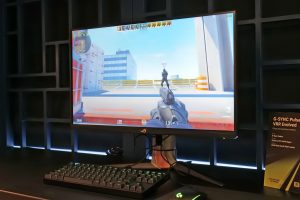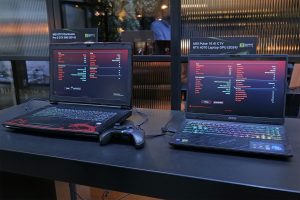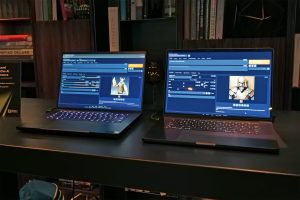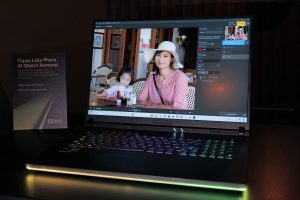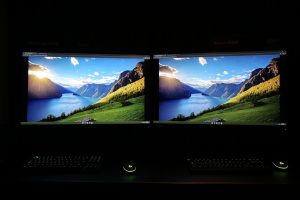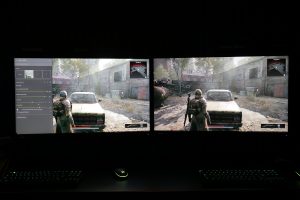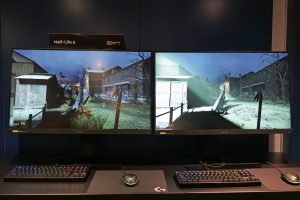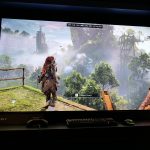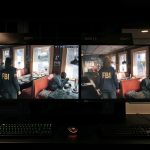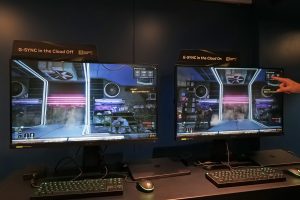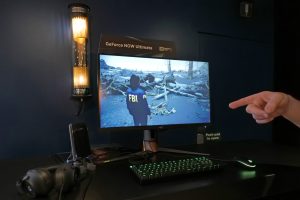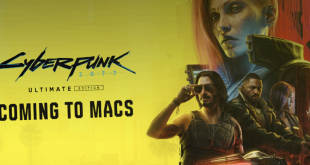It's been a hugely busy few months for Nvidia, with the company releasing not just new graphics cards, but plenty of software tools and features as well. KitGuru was invited to an event in Marylebone, London, where we got hands-on with just about every new piece of technology that the Green Team has launched over the last few months…
The day kicked off with a look at G-Sync Pulsar, which we first saw at CES 2024. This is a monitor technology which allows ULMB – Ultra Low Motion Blur – to be used in conjunction with variable refresh rate (VRR) tech. Using ULMB, which involves strobing the display's backlight to improve motion clarity, would previously necessitate disabling VRR, but now with Pulsar, there is no need to compromise.
We saw a demo running on what we were told is the only working G-Sync Pulsar prototype in the world, an ASUS ROG Swift PG27 series display. You can tell it is a prototype as there is actually a physical switch on the top of the display to enable and disable Pulsar, which obviously won't be on retail models!
Nvidia claims Pulsar allows them to achieve the equivalent motion clarity of ‘1000Hz' while running at much lower frame rates – our demo ran at 115 fps, for example. Pulsar definitely improved visible motion clarity when enabled during the demo, though there was a small amount of visible flickering – but we will reserve final judgement until it's in shipping products.
There were also a couple of laptops on show, both running Cyberpunk 2077. The interesting thing here is that the machine on the left is the MSI GT72 Dominator Pro G, launched all the way back in 2014 – and we actually reviewed a model from this series at the time! The one on show was packing a GTX 980 mobile GPU, and it was compared with an MSI Pulse 16 AI C1V machine from 2024, running an RTX 4070 laptop GPU.
This was clearly designed to show how far mobile technology has come in a decade. The machine from 2014 could barely run Cyberpunk 2077 at 30fps at 1080p. The modern system was capable of 75fps at a much higher 2560×1600 resolution, but also with ray tracing enabled (which the older machine simply doesn't support.) DLSS was enabled on the Pulse 16 to help push its frame rate up, but it's safe to say the experience was night and day between the two laptops.
One of the key demos on show was Nvidia ACE, first announced at Computex 2023, while a collaboration with Ubisoft was also unveiled at GDC 2024. We got hands-on with the Covert Protocol gameplay demo, where users can interact freely with NPCs using voice-to-text, by simply speaking into a microphone. NPCs can then respond to what you say thanks to the use of AI, giving insight into their personal stories, or dropping hints which may help to advance the story.
Right now, there's no timeline when ACE may first appear in a finished, shipping game. The potential to liven a game-world by having realistic NPCs with some actual character depth, thanks to the use of AI, is clearly massive. That said, there is still work to be done, as I noticed a definitely delay in conversation as the AI model and game takes on what you have just said and formulates a response. We're told that right now, everything runs on the cloud which adds some latency, but there is scope to have parts of the model run locally, which should help to speed things up.
AI was a big focus for Nvidia in other areas, too. We were shown two machines running Stable Diffusion – one a Razer Blade with RTX 4090 Laptop GPU, and the other a new Apple M3 MacBook. Using the exact same prompts, the Nvidia-powered machine delivered its end result image in 21.9 seconds, compared to 1 minute 14.6 seconds for the Apple machine, a win which Nvidia claims is due to the software being able to leverage the 4090's Tensor cores and their AI acceleration. We also saw an example of Topaz Labs using AI to remove objects from an image.
Nvidia has also recently begun leveraging AI to improve HDR content, too. Thanks to RTX Video HDR and the new Nvidia App, RTX GPUs can intelligently enhance SDR videos or games to run in HDR, enabling a more vibrant and eye-catching image in any game. Nvidia also suggested to us that even if a game already supports HDR natively, the ability to tune the HDR output using these tools can still be useful. As someone who has recently been using an MSI OLED monitor for HDR gaming, this was certainly right up my street!
RTX Remix is another prominent feature, the driving force behind the creation of Portal with RTX and now a whole host of other community-led mods. Remix essentially allows modders to go back and enhance older games such as Half Life 2 or Need for Speed Underground – Nvidia reckons DX9 titles work best – by using AI to enhance textures and add full-on path tracing. The end result is a dramatic increase in the visual fidelity of these older games, bringing them right up to date with the latest technological advancements.
Of course, DLSS was another big feature for Nvidia at the event, though KitGuru readers will be well versed with this technology as we have covered it numerous times in the past. Still, Horizon Forbidden West was looking beautiful on a large 4K OLED TV, running at about 115 fps on an RTX 4070 Super, thanks to DLSS Super Resolution and Frame Generation. Ray Reconstruction was also demoed in Portal with RTX alongside Alan Wake 2.
Finally, we also got a chance to see the latest from GeForce Now, Nvidia's cloud streaming service. We have covered this in the past with a look at GFN Ultimate, and of course this service now offers 4K 120FPS streams with support for G-Sync. It was also undeniably cool to see Alan Wake 2 running at High settings, all from a docked smartphone.
Discuss on our Facebook page HERE.
KitGuru says: We were familiar with most of these demos already, but it is quite incredible when you think how many different software tools and features Nvidia currently offers.
 KitGuru KitGuru.net – Tech News | Hardware News | Hardware Reviews | IOS | Mobile | Gaming | Graphics Cards
KitGuru KitGuru.net – Tech News | Hardware News | Hardware Reviews | IOS | Mobile | Gaming | Graphics Cards


